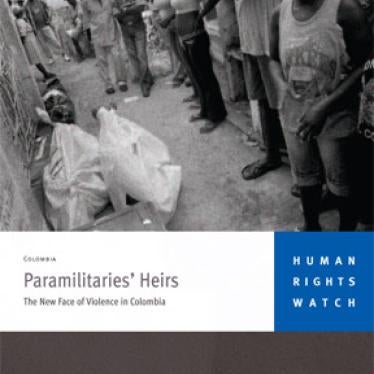(Washington, D.C.) - The US Congress should insist on vigorous enforcement of human rights commitments by Presidents Barack Obama and Juan Manuel Santos before moving forward on the US-Colombia Free Trade Agreement, Human Rights Watch said today. Congress should also insist on progress in confronting armed groups responsible for anti-union violence.
Obama and Santos are scheduled to present an "Action Plan" on April 7, 2011, with concrete steps to protect Colombian workers' rights. The Obama administration said that Colombia must successfully carry out key measures of the plan as a precondition for ratifying the trade agreement.
"The Obama administration has rightly recognized the need to condition FTA ratification on protections for Colombian trade unionists, who have for decades been killed in record numbers," said José Miguel Vivanco, Americas director at Human Rights Watch. "But today's commitments, while very important in some areas, avoid an issue at the heart of the problem: the continued operation of the powerful armed groups behind the bulk of anti-union violence and other abuses."
The proposed Action Plan requires the Colombian Attorney General's Office to improve the handling of crimes against union members. Ensuring compliance should include verifying that prosecutors pursue not only the direct perpetrator of a crime, but everyone with criminal responsibility, including those who order assassinations, Human Rights Watch said.
The Action Plan would also require the Attorney General's Office to consult regularly with local labor leaders to accelerate action on outstanding labor violence cases. Compliance should require specialized prosecutors for labor union cases to address all the cases reported by labor groups, not just the small fraction they are currently investigating.
"To have any impact, the Action Plan will need to be vigorously enforced, with compliance measured in terms of concrete results," Vivanco said.
Colombia leads the world in killings of trade unionists, with more than 2,800 reported killings since 1986, according to the National Labor School (ENS), Colombia's main nongovernmental organization monitoring labor rights. Levels of violence against organized labor remain alarmingly high: the ENS reports that, after dropping to 39 in 2007, the number of killings of unionists increased again, to 51 in 2008, 47 in 2009, and 51 in 2010.
Those responsible for union killings are rarely held accountable: only 25 percent of more than 2,800 ENS-documented killings of unionists are being investigated by the unit of the Attorney General's Office mandated to prosecute such crimes. Out of the reduced number of crimes against unionists investigated by the specialized unit, only 15 percent of the cases had resulted in convictions as of October 2010, according to official sources.
While most union killings have never been investigated, there is considerable evidence that right-wing paramilitary organizations and their successor groups are responsible for the largest share of these crimes. The successor groups frequently target trade unionists and commit widespread atrocities against civilians, including massacres, killings, rapes, and forced displacement. They are responsible for a 34 percent increase in massacres in 2010, and are estimated by Colombia's intelligence service to be responsible for 40 percent of the country's homicides. Toleration of these organizations by some local officials and members of public security forces is a significant factor in their growth.
In early February, President Santos announced a new plan to combat these paramilitary successor groups, which the government officially labels "emerging criminal gangs." But this plan has not yet been fully implemented and has yet to produce results in reducing abuses against civilians.
"While the Santos government has announced a new strategy to go after these groups, the omission of this issue from the Action Plan has eliminated an important incentive for following through," Vivanco said.






